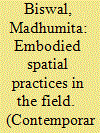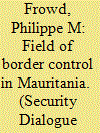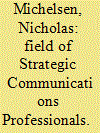|
|
|
Sort Order |
|
|
|
Items / Page
|
|
|
|
|
|
|
| Srl | Item |
| 1 |
ID:
180055


|
|
|
|
|
| Summary/Abstract |
Postmodern anthropology has used the claims of reflexivity, inter-subjectivity and recognition of differences in individual experiences in its attempt to unsettle the authority of traditional anthropology. This has led anthropologists to assert that ethnography is a cultural construct, whereby ‘fieldwork’ is conceptualised as ‘embodied spatial practice’. Drawing on village studies from India, this paper argues that the recognition of different embodied practices of ethnographers from diverse social locations has not necessarily led to the democratisation of the discipline. Conversely, insufficient engagement with hierarchical, overlapping power relations within the ethnographic field, as well as within the disciplinary establishment, has led to the standardisation of disciplinary articulations of research ethics, the terms of which privilege hegemonic groups within the discipline. The articulation of the concerns of scholars from marginalised social groups often remains difficult within such disciplinary frameworks. This paper argues that establishing a critical tradition in ethnography in the true sense requires the postmodern sensibility of recognition of the differences in experiences, supplemented with feminist and subaltern critical interrogations of power and knowledge.
|
|
|
|
|
|
|
|
|
|
|
|
|
|
|
|
| 2 |
ID:
132336


|
|
|
|
|
| Publication |
2014.
|
| Summary/Abstract |
Recent work on borders has tended to overlook border control actors, practices and rationalities in West Africa. States in this region are considered origin and transit countries for irregular migration, and the Sahel region that they straddle is widely seen as an emerging haven of terrorist activity. This article discusses one response to these migration and terrorism threats by the Islamic Republic of Mauritania: a programmme to build new border posts with help from global partners that include the European Union and the International Organization for Migration. The article builds on Bourdieusian approaches in critical security studies, but draws on concepts from actor-network theory to account for the heterogeneity of border control actors and the mobility of different knowledges about how to control borders. Drawing on ethnographic research in Mauritania, the article discusses four 'actants' of border security: the border posts, the landscape, the biometric entry-exit system and training practices. Throughout, the article highlights field dynamics of competition, cooperation and pedagogy, also emphasizing the role of non-human agency. The article concludes with a reflection on the link between border control and statebuilding, suggesting that this fusion is a broader paradigm of security provision in the global South.
|
|
|
|
|
|
|
|
|
|
|
|
|
|
|
|
| 3 |
ID:
164406


|
|
|
|
|
| Summary/Abstract |
Communication has long been accepted as integral to the conduct of international affairs. The role that discourses, ideas, norms, and narratives play at the systemic level of world politics has been examined extensively. Scholarly interest has now turned to how international actors use political communication tools to create and counter threats, such as propaganda, hybrid warfare, fake news, and election tampering, and it is often taken for granted that states are inferior to their challengers in these domains. To address this, ‘Strategic Communications’ has emerged as a mode of thought and practice promising to enhance state communication; encompassing long-established activities including public diplomacy, public relations, nation branding, and information operations. In this developing field, private sector professionals are increasingly being called on to support and advise governments. Particular attention has been paid to the ‘Big Data’ private companies may have access to, but there has been little IR research examining the experts seeking changes in how strategic communications is practised. Informed by elite interviews with communication professionals across the public-private space, this article sets out a research agenda to fill this gap, enhancing understanding of the expert relationships that shape international strategic communications.
|
|
|
|
|
|
|
|
|
|
|
|
|
|
|
|
| 4 |
ID:
161396


|
|
|
|
|
| Summary/Abstract |
Beyond the esoteric deliberations of Islamic jurists and their exegesis of criminal and private law doctrines, Iranian law lives a life of its own. It is a life of routine practices of judges, court clerks, lawyers and clients, each of whom is striving to turn the law to their own advantage. It is also a life of contested legality, a relentless struggle over the right to determine the law in a juridical field which is infused with strife and hostility. These conflicts are reproduced daily as two competing conceptions of law, and their corresponding perceptions of legality clash in pursuit of justice. The Iranian judiciary’s concept of law, its reconstruction of Islamic jurisprudence and methods of dispensing justice, which on the surface are reminiscent of Max Weber’s “qādi-justice,” collide with the legal profession’s formal rational understanding thereof. However, Iranian judges are not Weberian qādis, and the legal profession is not a homogenous group of attorneys driven by a collective commitment to the rule of law. To understand their conflict, we need to explore the mundane workings of the legal system in the context of the transformation of Iranian society and the unresolved disputes over the direction of its modernity.
|
|
|
|
|
|
|
|
|
|
|
|
|
|
|
|
|
|
|
|
|